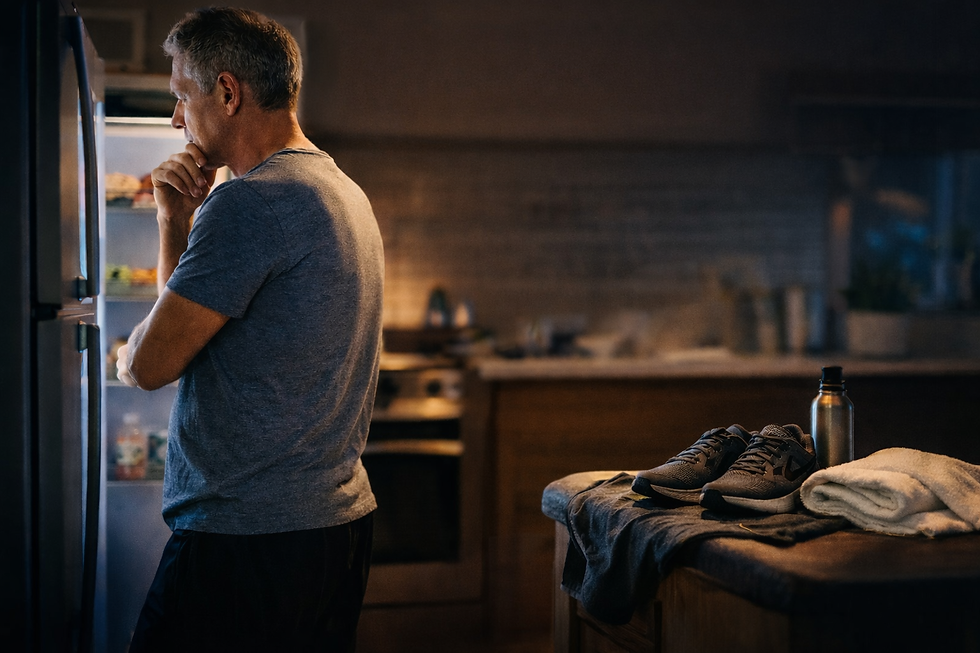Don't Follow A Diet Unless You Can Do This
- Chris Deavin
- Oct 15, 2025
- 4 min read
Why consistency, not the perfect plan, is the real missing ingredient to lasting health over the age of 50.

Whenever someone finds out I’m a health coach, the questions usually come thick and fast:
“What’s the best diet for weight loss? “How much exercise do I need to do to get in shape?”
It comes with the territory.
But the problem isn’t the questions, it’s my answer that tends to throw people.
I usually say:
“Turn the lights out.”
Cue the puzzled expression. Surely there’s more to it than that?
There is. But not in the way most expect.
Why “turn the lights out” matters more than your diet
In the book Lights Out by T.S. Wiley, the author shows that the more artificial light we’re exposed to, the more our body craves sugar. The result? Higher risk of obesity, diabetes, and metabolic syndrome.
So if you really want to lose weight, one of the most effective things you can do is actually reduce your exposure to artificial light, especially in the evening.
That might sound simple. That’s exactly the point.
The easier the habit, the easier it is to stick to.
Simple beats perfect—every time
Over the years, I’ve noticed the same pattern with my clients. The most successful ones don’t follow the most complex plans. They follow the simplest habits, and they follow them consistently.
Whether it’s turning off screens earlier, eating real food until they’re 80% full, or walking every morning before breakfast, these are all simple actions.
But here’s the thing:
Consistency is the ultimate skill.
It’s the difference between those who reach their goals and those who don’t.
You can have the best plan in the world, but if you can’t stick to it, it won’t matter.
Why consistency is a skill (not luck or motivation)
The fittest, healthiest people aren’t necessarily the ones with more willpower. They’re the ones who’ve learned how to turn consistency into identity.
They’ve practised it. They’ve designed for it. They’ve built systems around it.
That’s why The W.I.S.D.O.M Program I teach doesn’t just tell you what to eat or how to move, it helps you learn how to stay consistent, no matter what life throws your way.
Let me break that down:
Willpower: You can’t rely on it forever, but you can strengthen it through small wins.
Identity: When your habits become who you are, you stop “trying” and start “being.”
Small Wins: Progress that feels achievable fuels long-term change.
Design Your Environment: Make healthy choices easier by shaping your surroundings.
Overcoming Obstacles: Expect setbacks, plan for them, and keep going anyway.
Mindset: Think long-term. This isn’t a 12-week fix; it’s a lifelong foundation.
That’s how you build resilience, the real key to lifelong health.
The hidden truth: most people never learn how to be consistent
Very few health professionals teach this skill, and it’s no surprise why.
Consistency isn’t flashy. It doesn’t sell as easily as “six-week transformations” or “drop 10kg fast.”
It’s slow. It’s hard. It’s deeply unsexy.
But it works—every single time.
The problem is that most people chase excitement over effectiveness. They want instant results, not lasting ones. And that’s why most plans fail.
How to start building the skill of consistency
If you want to learn this skill, start small.
Anchor a new habit to an old one. Brush your teeth? Stretch your calves at the same time. One habit reinforces another.
Link behaviours to locations. When you enter a certain space, like your kitchen or home gym, associate it with one specific action.
Communicate your intentions. Tell your family, friends, or coach what you’re working on. People can’t support what they don’t know about.
Stay accountable. Whether it’s a journal, community, or coach—share your progress. We all perform better when someone’s watching.
Remember your “why.” If your reason isn’t strong enough, you’ll always find an excuse.
The uncomfortable truth
A “successful plan” is not one that worked for a few months, it’s one you can follow for life.
When a plan becomes part of who you are, it’s no longer a plan. It’s simply your way of living.
And that’s the goal of the W.I.S.D.O.M Program: to help you stop following diets or fitness fads, and start mastering the skill of consistency so you can live a healthy, resilient life—forever.
Final thought
You can keep spinning in circles, trying the next diet, the next app, the next challenge…or you can finally learn the skill that underpins all of them: consistency.
It’s not easy.
It takes time.
But once you learn it, you’ll never have to start over again.
If you’re ready to learn how to build consistency, not just chase motivation, that’s exactly what my 12-Week W.I.S.D.O.M Program is built to do.
👉 Learn more at www.myhealthcoach.online
Chris Deavin is the founder of myHealthCoach and creator of The W.I.S.D.O.M Program, a resilience-based coaching framework helping people over 50 build strength, confidence, and consistency for life.
He writes The Resilient Life newsletter and hosts The Resilient Life Podcast.
Follow his work at myhealthcoach.online and join the Resilient Life community to build a body, and mindset, that lasts.



Comments